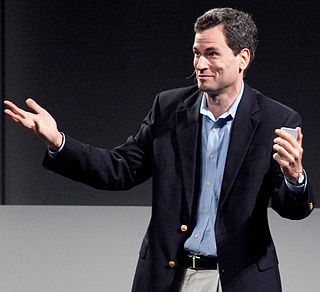A Quote by Steven C. Hayes
What keeps me up at night in a negative way is, if we don't solve the problems of the human heart and of the human head, of human psychology, there is no technological solution so great that it can prevent the world that is coming, and a world of suitcase bombs or of the ability to pollute the planet in a way that it cannot recover, of global warming and the rest. We've created through science and technology a different world that has frightening sides to it, and psychology and behavioral science has to be part of this. We're going to have to find a way to humanize the culture itself.
Quote Topics
Ability
Behavioral
Bombs
Cannot
Coming
Created
Culture
Different
Different World
Find
Frightening
Global
Global Warming
Going
Great
Head
Heart
Human
Human Heart
Itself
Keeps
Me
Negative
Night
Part
Planet
Prevent
Problems
Psychology
Recover
Rest
Science
Science And Technology
Sides
Solution
Solve
Suitcase
Technological
Technology
Through
Up
Warming
Way
World
Related Quotes
When we fly planes over countries, dropping bombs on the evil ones, I think we're doing something very similar to what's being done when the infidels are getting their comeuppance with planes going into buildings. So it's gotten to the point where if we are not healthy psychologically as a human society, we will not have a planet to live on. And that's what keeps me up at night, when I see so little focus on the behavioral side of these problems, and the idea that just politics, or just physical science, is going to solve this.
The changes that we can make in the culture can be there for people that we will never meet, that will never know us, and that's what keeps me up at night. It's what excites me about science, that we can learn ways of being with each other. And the behavioral sciences have not been enough of a part of cultural development. The physical sciences have; the behavioral sciences have not. And I would like to see if we can bring some things into human culture that would humanize and soften and empower people.
Think of a single problem confronting the world today. Disease, poverty, global warming... If the problem is going to be solved, it is science that is going to solve it. Scientists tend to be unappreciated in the world at large, but you can hardly overstate the importance of the work they do. If anyone ever cures cancer, it will be a guy with a science degree. Or a woman with a science degree.
Through scientific discovery and technological innovation, we enlist the forces of the natural world to solve many of the uniquely human problems we face - feeding and providing energy to agrowing population, improving human health, taking responsibility for protecting the environment and the global ecosystem, and ensuring our own Nation's security. Scientific discoveries inspire and enrich us, teaching us about the mysteries of life and the nature of the world.
The experience I'm talking about has given me one certainty: the salvation of this human world lies nowhere else than in the human heart, in the human power to reflect, in human meekness and in human responsibility. Without a global revolution in human consciousness, nothing will change for the better, and the catastrophe toward which this world is headed will be unavoidable.
The way to solve the conflict between human values and technology needs is not to run away from technology. That's impossible. The way to resolve the conflict is to break down the barriers of dualistic thought that prevent a real understanding of what technology is--not an exploitation of nature, but a fusion of nature and the human spirit into a new kind of creation that transcends both.
It is a complete embarrassment and literally shameful that the country that first of all invented environmentalism and gave it to the world, and second of all did all the science originally around climate and global warming and presented that to the world, has been the country that has refused to participate in a constructive way to the solution.
The task of evolutionary psychology is not to weigh in on human nature, a task better left to others. It is to add the satisfying kind of insight that only science can provide: to connect what we know about human nature with the rest of our knowledge of how the world works, and to explain the largest number of facts with the smallest number of assumptions.
The global warming is going on. These are not single cases. These are all part of a general way we've been looking at the world. As long as we look at the world that way it's going to go on. Because the idea that the important thing is for some people get rich while the rest of the people work for them is very deeply dug in...
The science of psychology has been far more successful on the negative than on the positive side... It has revealed to us much about man's shortcomings, his illnesses, his sins, but little about his potentialities, his virtues, his achievable aspirations or his psychological health... We must find out what psychology might be if it could free itself from the stultifying effects of limited, pessimistic and stingy preoccupations with human nature.
I would teach the world that science is the best way to understand the world and that for any set of observations, there is only one correct explanation. Also, science is value-free, as it explains the world as it is. Ethical issues arise only when science is applied to technology - from medicine to industry.































